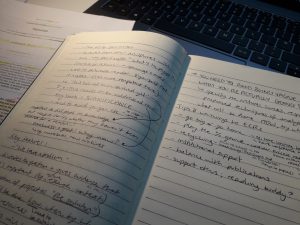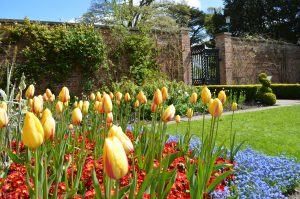
October 1, 2019, by Emma Putland
After the PhD: Writing, Funding and Precarity
 This summer Dr Jonathan Memel (@jgmemel) gave a fantastic talk for the third seminar of our 2019 series, where he drew on his personal experience (as a PhD student and early career researcher, Research Grant Writer, AHRC Cultural Engagement Fellow and now Research Fellow) to give some insights and advice into the world of academic applications from an Arts and Humanities perspective. We thought that it might be useful to summarise some of his pearls of wisdom here for you, so, grab a drink of your choice (I personally recommend tea) and settle in for a great read…
This summer Dr Jonathan Memel (@jgmemel) gave a fantastic talk for the third seminar of our 2019 series, where he drew on his personal experience (as a PhD student and early career researcher, Research Grant Writer, AHRC Cultural Engagement Fellow and now Research Fellow) to give some insights and advice into the world of academic applications from an Arts and Humanities perspective. We thought that it might be useful to summarise some of his pearls of wisdom here for you, so, grab a drink of your choice (I personally recommend tea) and settle in for a great read…
First off, some context on the developing field of academia:
Funding within Higher Education is in general becoming less secure and continuous, often being subject to assessments such as REF/TEF, and student demand. Jobs within Higher Education are also increasingly precarious, with a tremendous growth in fixed-term and temporary contracts, and a decline in permanent positions.
In terms of funding, external grants are playing an increasingly large role within Higher Education, and there are a lot of resources and opportunities provided by some big sources, such as the AHRC (~£70m/ year), GCRF (£1.5bn/5 years) and the EU/Horizon 2020 (UK receives ~£8bn / 6 years).
The key criteria for funding projects are also shifting. Notably, collaboration is increasingly promoted, encouraging a team-based model of research (and therefore challenging the traditional concept of “the lone scholar” and single authored work). Impact is also ever more essential, especially for externally-funded projects. This is sometimes reflected by new postdoctoral roles emerging in teams such as “public engagement coordinator”. These can be great opportunities, but beware of the fact that many of the benefits of impact cannot be taken with you if you change to another institution (i.e. they are non-portable for REF), and so remember the value of continuing with your own research and/or being credited for research if you want to continue into academia.
 Finally, for those entering mid-career and onwards (especially for those going into the more science-based fields), be aware that you are increasingly expected to demonstrate the ability to acquire funding. This is becoming an important criterion for some lectureships.
Finally, for those entering mid-career and onwards (especially for those going into the more science-based fields), be aware that you are increasingly expected to demonstrate the ability to acquire funding. This is becoming an important criterion for some lectureships.
So, how do you get funding?
That is an excellent question, and one that Jonathan spent the rest of his talk addressing…
The art of grant writing
Despite having a lot of overlap, grant writing is different in many ways to academic writing in general. Although any academic writing requires you to persuade readers that your work is worth reading, this becomes even more of an art form for grants, since you are no longer in the comfort of your own field. For this reason, you MUST AVOID JARGON AND BE VERY CLEAR! Always bear in mind that you are writing for people who are, and are not, familiar with your area of expertise. Reviewers from other disciplines will ask “why does it matter?” and “what’s the payoff?” – so be sure to answer these questions clearly and persuasively. Sometimes it’s enough to say that ‘this has not been studied yet’ but be careful not to be overly reliant on this, as you still need to address why it should be studied (maybe it hadn’t previously been studied for a reason!). Equally, why should it be studied now? Timeliness (such as important anniversaries or new material becoming available) is always a crowd-pleaser, since it helps to answer the “why now” question, but there are many ways to emphasise the significance of your work.
Jonathan then proceeded to give us even more of a helping hand, by suggesting a rough structure for a successful application.
- Set the scene by outlining that in some way, `we have a problem’ – this can then dictate your research question(s) and gives evidence that your project is important. Remember that this isn’t a literature review: only mention other work if it helps to support ‘the problem’.
- Position your project as `the solution’ – and remember to answer why you are the best person or team to address “the problem”.
- Be specific about what your project involves, as reviewers want to know how the funding will be used. State what will be done, how (e.g. what is your method/means of analysis?), when will you do things (what is your timetable and timeframe?), who will do what (i.e. if a team project, who are the team members and what will they each bring to the project?), and what resources you have (e.g. regarding data and contacts)? In sum: state the how, what, who and when?
- Also detail how your findings will be disseminated, and any impact that your research will have.
Finally, Jonathan offered some fantastic tips and warnings for early career researchers. We’ve outlined the key ones here for you below:
- Go Big or Go Home – this is as common for more senior researchers, but it’s easy to fritter away your time on smaller proposals that require a lot of effort, yet do not necessarily pay off in terms of time to conduct research. Remember, your priority as an ECR is having your time paid for: be protective about this. Basically, have the confidence to go for bigger grants and value your time!
- Play the Percentage Game – research the success rates for different grants and gain an idea of the profiles of successful candidates/projects so that you spend your effort on applications that are viable for you. Be cautious, and ask: will your time be reimbursed? Is your position written into the proposal?
- Recycle – the trick to success is to persist (but in a time effective way). Many successful applications were previously rejected elsewhere, so rejection certainly does not mean that your ideas are undeserving of funding – redraft and recycle your proposals.
- Institutional support – don’t underestimate the value of an institution and its academic staff backing you and your project. For some schemes, such as the Leverhulme ECR, this is essential to the selection process. More generally, support will enable you to better embed your proposal in the research culture of the institution(s) (i.e. when applying for a postdoc) and may lead to other opportunities. Be warned that institutional research support teams are often orientated around large grants for which they can claim overheads and indirect costs: all of which are uncommon for early-career grants. The institution’s main incentive to support your individual postdoctoral fellowship proposal will instead be your future contribution to research culture and prestige. Prioritize relationships with academics in post, who should see the value of your work, particularly if it is framed in relation to their own approach to research.
- Balance with publications – don’t get too carried away with funding applications and projects. Publications are critical to getting your next job, so balance your time. Consider taking a more secure academic-related job if it will allow you to focus on publications and make you more competitive.
- Support each other – when you leave the PhD you realise that you weren’t doing it alone: suddenly there’s no mentor, formal support structure, or review process. Try to imitate this kind of support with your peers, perhaps by swapping work and being writing buddies…

We are incredibly grateful to Dr Jonathan Memel for giving such an insightful and valuable perspective on postgrad/ECR life and the art that is writing funding proposals.
Finally, please remember that one of the support networks for you during your PhD and beyond as an early career researcher is through this group. We welcome any and all contributions – in the form of sharing research ideas, discussions on postgrad/ECR life, suggestions for the group and more – so please do get in touch with our team if you have any questions or ideas.
With best wishes,
The Early Bird Researcher Group Team
Nottingham Health Humanities
Frances Cadd, School of Humanities (frances.cadd@nottingham.ac.uk)
Mathilde Vialard, School of Health Sciences (mathilde.vialard2@nottingham.ac.uk)
Emma Putland, School of English (emma.putland@nottingham.ac.uk)
Dr Colin Wright, School of Cultures, Languages and Area Studies (colin.wright@nottingham.ac.uk)
Twitter: @HealthHumanEBR
No comments yet, fill out a comment to be the first

Leave a Reply